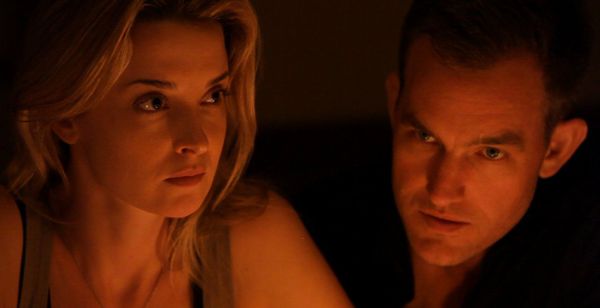Eye For Film >> Movies >> Coherence (2013) Film Review
Coherence
Reviewed by: Andrew Robertson

Coherence mentions alternate reality romance Sliding Doors itself, but thats' part of a frame that does something much more impressive with much smaller events. There's a dinner party, a gathering at Mike's house. Played by Nicholas Brendon who was Xander in TV's Buffy The Vampire Slayer, Mike played Joe in TV's Roswell. Apparently more than somewhat improvised, the rest of the cast are at slight remove from themselves - Hugo Armstrong is Hugh, Elizabeth Gracen is Beth, Alex Manugian is Amir, Lauren Maher is Laurie, Lorene Scafaria is Lee, Maury Sterling is Kevin, and Kevin is waiting for a decision about a trip to Vietnam from Emily Foxler's Em.
Dinner brings these eight together, during the passage of a comet. A comet that is blamed for cracked phone screens, a power outage. Hugh eventually reveals that if anything weird happened, he was supposed to call his brother. Mike's house doesn't have a landline, but there's a house up the road that's got the lights on, the only one in the neighbourhood. By the time that Mike gets his own generator up and running, there's a knock on the door...

Playing with parallel realities and probabilities and a couple of key elements of quantum theory, with jokes and puzzles and a box inside a box, this is a clever, minimal bit of film-making, one that uses one location in dozens if not half a billion ways to create tension and drama, even horror.
With a variety of disparate elements, Coherence's focus shifts them into a number of patterns. The eight friends have a complicated history, with some of them having been with others. There are unresolved issues, undisclosed issues, and a wholly natural herbal remedy with passionflower, echinacea, ketamine...
This is a feature debut for director James Ward Byrkit, who shares writing credit with Alex Manugian. Byrkit previously contributed to Rango, and while there's a similar weirdness here, it's not so much borne of peyote (though horse tranquilisers probably don't help) as particle physics.
Well, rather, planetary ones - there's a comet, quite well presented in blurry proximity, and there's a house with the lights on, and a dinner party inside, and up the street there's a different house, with different lights, and a different dinner party, and both of them have the same address, and the same occupants, at least initially.
It's a simple set up, well explained within its confines. Nic Sadler's cinematography plays with focus on a few occasions, Kristin Ohrn Dyrud's score unsettles without overpowering, but it's the quality of the performances that really grounds Coherence. With the wrong tone, an over-reliance on effects, in any of a dozen ways it's clarity and consistency that give Coherence strength and in at least twice six directions it could lose them, but it doesn't. There might be utility in suggestion that good science fictional stories should work as stage plays, no reliance on 'ooh' or 'ah' from unpopulated green rectangles, nor tennis balls on sticks to react to, just human problems with human solutions caused or brought about by science. There are props, telephones and boxes, marker pens and photographs, glowsticks too, and dice - Hawking suggests that "All the evidence points to [God] being an inveterate gambler", but Coherence is a sure thing - a domestic discombubulator, a dizzying delight.
Reviewed on: 24 Jun 2014















